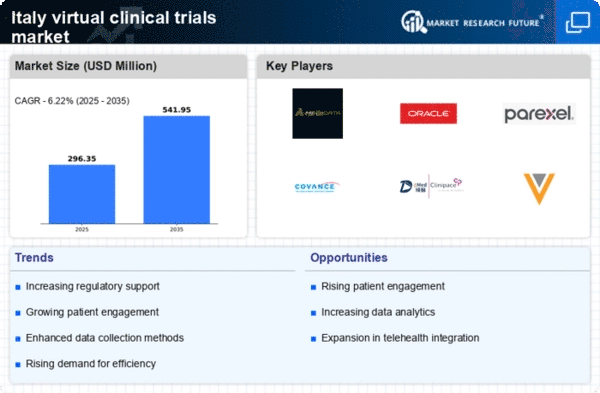Cost Efficiency in Clinical Research
Cost efficiency emerges as a critical driver for the virtual clinical-trials market in Italy. Traditional clinical trials often incur high costs due to extensive site visits, patient recruitment challenges, and logistical complexities. In contrast, virtual trials can reduce operational costs by up to 30%, as they minimize the need for physical infrastructure and streamline patient engagement processes. This financial advantage is particularly appealing to smaller biotech firms and research institutions that may have limited budgets. As the Italian healthcare sector increasingly recognizes the potential for cost savings, more organizations are likely to adopt virtual methodologies. This shift not only enhances the feasibility of conducting trials but also encourages innovation in trial design, ultimately contributing to the growth of the virtual clinical-trials market.
Enhanced Patient Engagement Strategies
Enhanced patient engagement strategies are becoming a cornerstone of the virtual clinical-trials market in Italy. As patient-centric approaches gain traction, clinical trial sponsors are increasingly focusing on improving communication and interaction with participants. Innovative tools such as telemedicine consultations, online platforms for patient feedback, and educational resources are being utilized to foster a more inclusive trial experience. This shift is reflected in a recent survey indicating that 75% of patients prefer trials that offer flexible engagement options. By prioritizing patient needs and preferences, sponsors can improve retention rates and data quality, which are critical for trial success. This emphasis on patient engagement is likely to drive the growth of the virtual clinical-trials market, as it aligns with broader trends towards personalized medicine and patient empowerment.
Regulatory Support for Innovative Trials
Regulatory support is increasingly influencing the virtual clinical-trials market in Italy. The Italian Medicines Agency (AIFA) has been proactive in establishing guidelines that facilitate the implementation of virtual trials. This regulatory framework aims to ensure patient safety while promoting innovation in clinical research methodologies. As of November 2025, approximately 70% of new clinical trial applications in Italy incorporate virtual elements, reflecting a growing acceptance of these methodologies by regulatory bodies. This supportive environment encourages pharmaceutical companies to explore virtual trial designs, which can expedite the drug development process. The alignment of regulatory policies with industry needs is likely to foster a more robust virtual clinical-trials market, ultimately benefiting patients and researchers alike.
Increased Demand for Remote Participation
The virtual clinical-trials market in Italy experiences a notable surge in demand for remote participation. This trend is driven by the growing preference among patients for convenience and accessibility in clinical research. As of November 2025, approximately 60% of patients express a desire to participate in trials from the comfort of their homes. This shift not only enhances patient recruitment but also broadens the demographic reach of clinical studies. The Italian healthcare system is adapting to this demand, leading to an increase in virtual trial offerings. Consequently, pharmaceutical companies are investing in digital platforms to facilitate remote monitoring and data collection, which is expected to enhance the efficiency of clinical trials. This evolving landscape indicates a significant transformation in how clinical research is conducted, positioning the virtual clinical-trials market for substantial growth in the coming years.
Technological Advancements in Data Management
Technological advancements play a pivotal role in shaping the virtual clinical-trials market in Italy. The integration of sophisticated data management systems and analytics tools enhances the ability to collect, analyze, and interpret clinical data efficiently. As of November 2025, the adoption of artificial intelligence (AI) and machine learning (ML) in clinical research is on the rise, with approximately 40% of trials incorporating these technologies. This trend allows for real-time data monitoring and improved patient safety, as potential issues can be identified and addressed promptly. Furthermore, the use of mobile applications and wearable devices facilitates continuous patient engagement and data collection, which is essential for the success of virtual trials. These technological innovations are likely to drive the virtual clinical-trials market forward, making it more attractive to sponsors and researchers alike.
















